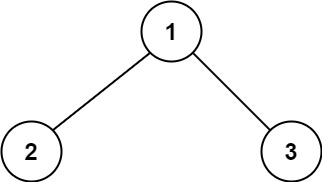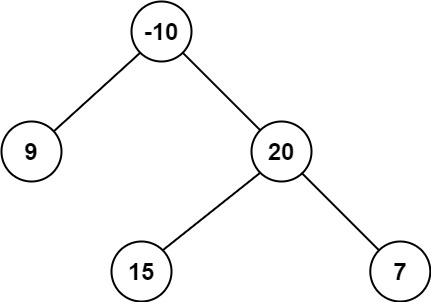Binary Tree Maximum Path Sum
Problem Statement
A path in a binary tree is a sequence of nodes where each pair of adjacent nodes in the sequence has an edge connecting them. A node can only appear in the sequence at most once. Note that the path does not need to pass through the root.
The path sum of a path is the sum of the node's values in the path.
Given the root of a binary tree, return the maximum path sum of any non-empty path.
Example 1:

Input: root = [1,2,3]
Output: 6
Explanation: The optimal path is 2 -> 1 -> 3 with a path sum of 2 + 1 + 3 = 6.
Example 2:

Input: root = [-10,9,20,null,null,15,7]
Output: 42
Explanation: The optimal path is 15 -> 20 -> 7 with a path sum of 15 + 20 + 7 = 42.
Constraints:
- The number of nodes in the tree is in the range
[1, 3 * 104]. -1000 <= Node.val <= 1000
Solution
/**
* Definition for a binary tree node.
* struct TreeNode {
* int val;
* TreeNode *left;
* TreeNode *right;
* TreeNode() : val(0), left(nullptr), right(nullptr) {}
* TreeNode(int x) : val(x), left(nullptr), right(nullptr) {}
* TreeNode(int x, TreeNode *left, TreeNode *right) : val(x), left(left), right(right) {}
* };
*/
class Solution {
public:
int maximumPathSum = INT_MIN;
int dfs(TreeNode* node) {
if (node == nullptr) {
return 0;
}
int pathSumLeft = dfs(node->left);
int pathSumRight = dfs(node->right);
int pathSumAtNode = node->val + pathSumLeft + pathSumRight;
maximumPathSum = max(maximumPathSum, pathSumAtNode);
// printf("Val: %d, path-left: %d, path-right: %d, max-path: %d\n",
// node->val, pathSumLeft, pathSumRight, maximumPathSum);
return max(0, max(pathSumLeft + node->val, pathSumRight + node->val));
}
int maxPathSum(TreeNode* root) {
dfs(root);
return maximumPathSum;
}
};
